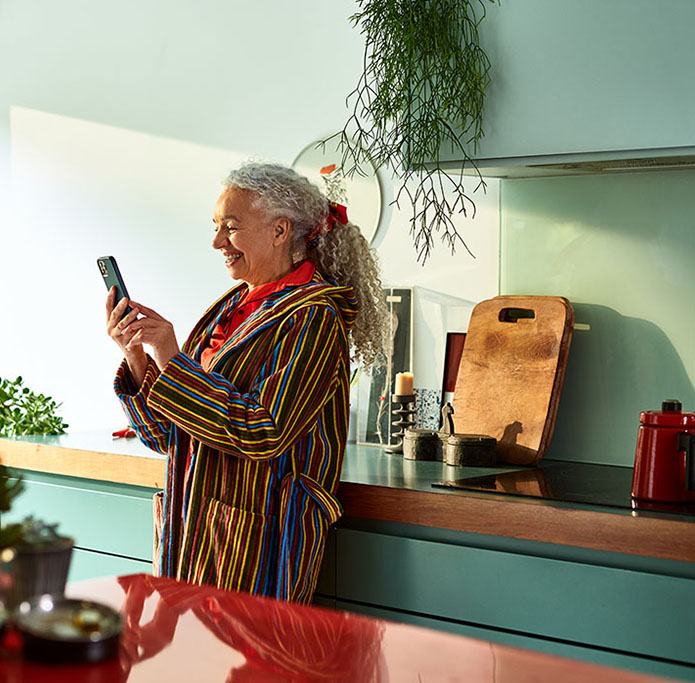Follow these guidelines to protect the security of Devices, which include your AMP Bank Access Card (Access Card) and Security Access Codes, which include: Personal Identification Numbers (PIN); TelePINs; secret questions; answers to secret questions; and other user names and passwords.
It’s important that you follow these guidelines to minimise the chance you, and any additional signatories to your account(s), might be held liable for unauthorised use of your account(s)
Protecting your account
You must make every effort to ensure that your account Devices and Security Access Codes are not breached, misused, lost or stolen. If you fail to observe the reasonable security requirements set out below you may incur liability for transactions or access to your account that you have not authorised.
AMP Bank (we, our, us) requires you to:
- Regularly check your account or statements for any transactions you do not recognise. You can also view all recent transactions online via My AMP and the AMP app.
- Advise us immediately if you have changed your mailing address.
- In the event that the security of any of your Security Access Codes are breached, lost or stolen, or you suspect that your Security Access Codes are known to someone else or you suspect an unauthorised use of your account, you must tell us immediately by contacting us either on 13 30 30 or +61 2 8048 8249 when calling from overseas.
- Not provide your Access Card details over the phone or the Internet if you have any concerns about the security measures used by an organisation.
- OR - If you suspect an unauthorised use of your account you must contact us immediately by either calling 13 30 30 or +61 2 8048 8249 when calling from overseas.
Your obligations
For Access Card(s)
To protect your Access Card you must:
- Sign your Access Card as soon as you receive it.
- Not record or disguise your PIN or other Security Access Code on your Access Card, on any article normally carried with you, eg your wallet, or in any low security electronic device of any kind, such as (but not limited to) calculators, personal computers, electronic organisers, mobile phones.
- If you are no longer using the Access Card or it has expired, cut your Access Card into several pieces and return it to us.
- Carry your Access Card with you whenever possible.
- Regularly check you have your Access Card.
- Not let the Access Card leave your sight when making purchases.
- Not allow anyone to swipe your Access Card more than once without providing you with a ‘transaction cancelled’ receipt.
- Retrieve your Access Card from ATMs.
- Treat your Access Card as if it were cash.
- Not give your Access Card to anyone else, including family and friends.
For Security Access Codes
To protect your Security Access Codes you must:
- Destroy any communication we send you containing a Security Access Code once you have read it.
- Not record or disguise your Security Access Code on or near an Access Card or Mobile Device, on any article normally carried with you, eg your wallet, or in any low security electronic device of any kind, such as (but not limited to) calculators, personal computers, electronic organisers and mobile phones.
- Not permit any other person to use your Security Access Codes.
- Not disclose your Security Access Codes to any other person (including a family member, a friend or one of our staff or agents) for any reason.
- Avoid letting people see you enter your Security Access Codes into a keypad or keyboard by covering your hand, while typing your Security Access Code with your other hand.
- In the case of BankAssist, do not reveal your full TelePIN to any of our staff.Only reveal the 2 digits requested.
- Not use BankAssist service in such a way that your TelePIN or your Account Number can be overheard by others.
- In the case of BankFax, do not leave your details so they can be observed by others.
- Take reasonable steps to maintain the security of your hardware and software.
- Not enter your PIN in an ATM that appears to have been tampered with.
- Notify us if you do not receive the PIN for a new Access Card, if the PIN for an Access Card changes without you requesting it, or the PIN mail advice has not been received intact.
- You must not use a numeric pass code that represents your birth date or an alphabet Security Access Code that is a recognisable part of your name.
What is a reasonable attempt to disguise a Security Access Code?
- If you require an aid to help you remember a Security Access Code, make sure that any such aid is reasonably disguised. The following are examples of what must not be done with your Security Access Code:
- Do not record your disguised Security Access Code by reversing the number sequence or by using alphabetical characters or numbers: A=1, B=2, C=3, etc.
- Do not disguise your Security Access Code by using any of the following combinations (or parts of them): dates of birth, personal telephone numbers, car registration numbers, family members’ names, social security numbers or licence numbers.
- There may be other forms of disguise that may also be unsuitable. You must exercise extreme care if you do decide to record a memory aid for your Security Access Code.
When accessing My AMP using a PC or mobile device you should:
- Make sure you are accessing the correct website address amp.com.au
- Make sure you can locate the padlock symbol on your screen before you enter your logon details
- Look for ‘https’ in URLs displayed in your browser’s address bar.The ‘s’ stands for secure. If you don’t see it, you’re not in a secure web session and shouldn’t enter any Security Access Code or personal or financial data
- Check the last logon time and date displayed on the welcome screen. If this is not correct contact us immediately
- Change your password on a regular basis. This can be done securely through My AMP if you have provided us with your Australian mobile phone number and are able to receive sms messages. Phone 13 30 30 if we do not have your mobile phone number
- Never provide anyone, including AMP Bank staff with your user name and password
- Logoff and close the My AMP browser when you have finished
- Never allow your Internet browser to save your password for you.
When using the Internet, you should:
- Avoid using shared computers, eg Internet cafes. If you do use a shared Internet computer you should change your password as soon as possible
- Never click on a link in an email which purportedly sends you to My AMP. Open a new browser window and type amp.com.au. Hyperlinks can show you one thing, but send you somewhere else. We will never send you an email with a link to My AMP
- Never click on any attachments on suspicious emails. They could contain viruses or spyware that records where you go online and captures any passwords or credit card numbers you type
- Install and regularly update firewall, anti-virus, anti-spyware and spam filtering software on your home PC. If automatic updates are available, ensure they are enabled
- Delete spam without reading it. Don’t open or ‘preview’ emails from unknown sources. Check if your Internet Service Provider (ISP) offers a spam filtering service
- Shop online with reputable dealers and if you are unsure use other means to verify them, eg call them.
We monitor transactions to meet regulatory and compliance obligations relating to anti-money laundering and counter terrorism financing.
We may:
- Disclose information to regulatory and/or law enforcement agencies where legally obliged to
- Delay, block or refuse transactions where we have reasonable grounds to believe that they breach Australian law or the law of another country
- Require additional information from you to enable us to comply with our obligations.
You must not initiate or conduct a transaction that may be in breach of Australian law or the law of any other country.
No transaction entered into by you can be an unauthorised transaction for the purpose of determining liability for unauthorised transactions.
Your liability for losses will be determined under the ePayments Code (summarised below – however, you should refer to the actual Code for full details), where that code applies, rather than the guidelines provided.
You are liable for loss resulting from an unauthorised transaction:
a. Where we can prove on balance of probability that you have contributed to the loss:
- through your own fraud or your contravention of the security requirements as set out in paragraph (b) below and you will be liable for the actual loss which occurred before you told us of your Access Card or Security Access Code being misused, lost or stolen, or
- by your unreasonable delay in telling us after you became aware of the misuse, loss or theft of your Access Card or Security Access Code and you will be liable for actual loss which occurred between:
- The time you became aware or should reasonably have become aware that your Access Card or Security Access Code has been breached misused, lost or stolen, and
- When you told us.
However, your liability will not extend to the following amounts:
- The portion of loss which exceeds the daily transaction limit.
- The portion of loss which exceeds any periodic transaction limit.
- The portion of loss which exceeds the balance of your account (including any prearranged credit).
- All losses incurred on any accounts which AMP Bank and you had not agreed could be accessed using the access method.
Where a Security Access Code was required and neither of the situations (i) or (ii) above apply, you are liable for loss resulting from unauthorised transactions to the smallest of these amounts:
- $150.
- The balance of your Account (including any prearranged credit), or
- The actual loss as at the time you told us that your Access Card had been misused, lost or stolen or your Security Access Code has been breached.
For any period when our 13 30 30 service is not available for you to provide us notice of the misuse, loss or theft of your Access Card or Security Access Code, you will not be liable for any losses occurring as a result of the non-notification during that period, provided that notification is made within a reasonable time of the 13 30 30 service again becoming available.
b. You are in breach of the security requirements if you:
- Are engaging in fraud
- Keep a record of one or more Security Access Codes (without making any reasonable attempt to protect their security) on one article or several articles that are kept with the Access Card or which could be lost or stolen at the same time as the Access Card
- Disclosed your Security Access Code to anyone including a family member or friend
- Wrote or indicated a Security Access Code (without making a reasonable attempt to protect the security) on an article that could be lost or stolen
- Allowed someone else to use your Security Access Code
- Acted with extreme carelessness in failing to protect your Security Access Code
- Use a numeric pass code that represents your birth date or an alphabet Security Access Code that is a recognisable part of your name.
Your transactions
No transaction entered into by you can be an unauthorised transaction for the purpose of determining liability for unauthorised transactions.
You are not liable for loss resulting from an unauthorised transaction if:
- The loss is caused by the fraudulent or negligent conduct of AMP Bank’s employees’ or agents’ or companies involved in networking arrangements or of merchants or their agents or employees
- The loss resulted from the use of an Access Card or Security Access Code that was forged, faulty, expired or cancelled
- The loss occurred before you received your Access Card or Security Access Code
- The loss is caused by the same transaction being incorrectly debited more than once
- The loss occurred after you told us that your Access Card or Security Access Code had been misused, lost or stolen
- It is clear that you did not contribute to the loss
- The loss resulted from the unauthorised use of an Access Card where a PIN was not required and you did not delay reporting the loss or theft of the Access Card.
Chargebacks
If you use the ‘credit’ button, purchase goods online or over the phone or transact using Contactless methods on an AMP Visa Debit Card, you may be eligible for a chargeback.
Visit amp.com.au/bankdisputes for more information.
More information on bank security
To read more about keeping safe:
- visit Scamwatch at scamwatch.gov.au
- visit Stay Smart Online at staysmartonline.gov.au
- read our Security Alerts at amp.com.au/securityalert
More information is also available at amp.com.au/banksecurity.
Contact us
Call 13 30 30
Email info@ampbanking.com.au
Reply Paid 79702, PARRAMATTA NSW 2124
Mon - Fri: 8am – 8pm (AEST)
Sat & Sun: 9am – 5pm (AEST)
We're here to help
Banking
Call us 13 30 30
Email us info@ampbanking.com.au
Mon - Fri 8am - 8pm Sydney time
Sat & Sun 9am - 5pm Sydney time
Lost & stolen cards
Call us 13 30 30
Overseas? Call (+61 2)8048 8249
24 hours / 7 days a week to report a lost or stolen
AMP Bank Visa Debit Card.
Important information
Credit and deposit products are issued by AMP Bank Limited ABN 15 081 596 009, AFSL and Australian credit licence 234517.
It’s important to consider your circumstances and read the relevant Product Disclosure Statement or Terms and Conditions before deciding what’s right for you. This information hasn’t taken your circumstances into account. Information including interest rates is subject to change without notice.
Any application is subject to AMP Bank’s approval. Terms and conditions apply and are available at amp.com.au/bankterms or 13 30 30. Fees and charges may be payable. Full details are available in the Fees and charges guide.
This information is provided by AMP Bank Limited. Read our Financial Services Guide available at amp.com.au/fsg for information about our services, including the fees and other benefits that AMP companies and their representatives may receive in relation to products and services provided to you. All information on this website is subject to change without notice.
AMP Bank is a member of the Australian Banking Association (ABA) and is committed to the standards in the Banking Code of Practice.
A target market determination for these products is available on our TMD page.







